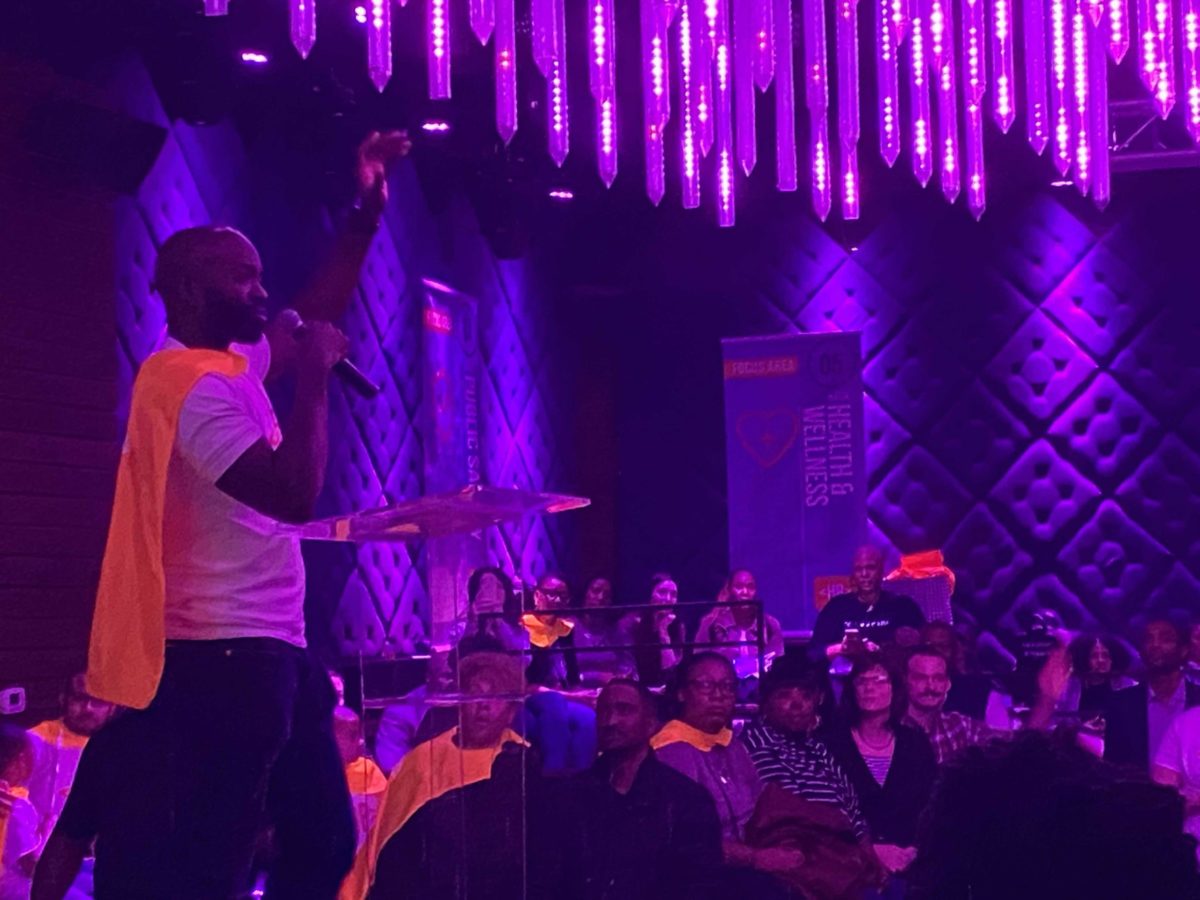Wearing a cape, Delali Dzirasa took the mic at Power Plant LIVE’s Mosaic nightclub on Wednesday night.
“We keep waiting as if someone’s going to save us and that’s not happening,” Dzirasa said. “Superman is not on the way and we’ve got to put on a cape.”
He wasn’t alone in donning the cape that night. In this case the hero’s welcome was cast toward technologists, designers, civic and business leaders, educators and, in general, Baltimore residents.
In other words, civic hackers.
Dzirasa, who by day is CEO of downtown Baltimore digital services agency Fearless, was in this case serving in his alter-ego as chair of Hack Baltimore. After more than a year of planning, it’s set to culminate with a hackathon at Inner Harbor’s Columbus Center on the weekend of May 8 to 10.
“We have two fundamental beliefs at Hack Baltimore,” Dzirasa said. “Number one, that our problems can be solved, and number two, that we have a whole city and host of people that want to solve challenges. We married them together and Hack Baltimore was born.”
Through design jams and an idea portal, the organizing team has been gathering ideas to work on, and engaging with city leaders. With the portal serving as a place to propose problems to solve and form teams, it’s designed to be an open source project that lives on past the weekend, said technology chair and SmartLogic President Yair Flicker.
“This isn’t the type of hackathon where in three days everybody goes back to work or goes home and the project dies,” Dzirasa said. “The view is toward sustainability and making sure that we take the time to fix things and they stay fixed.”
Judging from the hundreds of ideas that have surfaced so far, it’s also not looking to shy away from some of the city’s most pressing challenges.
Just as when former mayor Catherine Pugh resigned on the same day as a Hack Baltimore design jam last spring, the events of the day brought into relief how these challenges continue: On the afternoon before the event took place, two police officers were shot while serving a warrant in Northeast Baltimore.
While separate, the fact that the events on the same day underscored the urgent need for new solutions to take root. Hackathon co-chair Dionne Joyner-Weems summed it up this way:
“Should we leave and bury our heads or should we come together and tackle the challenges that are impacting our residents our families our friends?” she said. “Do we call off an event where we are allow people to get off of the sidelines and engage in change?”
Officials who attended the event and demoed identified themselves as “early adopters” of Hack Baltimore. They highlighted some of the problems they were interested in seeing tackled. In all, there are six focus areas: housing, education, transportation, workforce development, health and wellness, and public safety.
In the area of public safety, Baltimore City State’s Attorney Marilyn Mosby said witness intimidation is a big issue in the criminal justice system, leading to dropped cases. It’s an issue that she was heading to Annapolis to testify about before the state’s General Assembly the next day, but it was also one where the folks gathered Wednesday could help, she said.
“Technology can have a huge impact on those efforts,” she said. “The ability for witnesses of crime to remain anonymous and feel secure when providing information is paramount.”
https://twitter.com/margaret_h_r/status/1227770255612706816
For health and wellness, Baltimore City Health Department Chief Information Officer Mike Fried spoke about the opioid crisis and disparities in life expectancy between neighborhoods. The organizer of Code for Bmore said it’s also a city of entrepreneurial and creative talent.
And education was clearly top of mind. Joyner-Weems pointed out teachers who were gathered. And Dzirasa said he was galvanized to action by the 2018 news that children were freezing inside Baltimore city schools classrooms that lacked heat.
Some projects will cross multiple areas, Flicker said, giving the example of creating a fix for the city’s water billing system.
Tisha Edwards, director of the Mayor’s Office of Children and Family Success, challenged attendees to create a “heroic” plan for squeegee kids, and work for youth.
“I need Baltimore and its civic hackers to roll up its sleeves and fundamentally tell us how we can use your great ideas and your energy to save lives,” she said.







